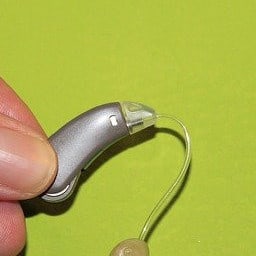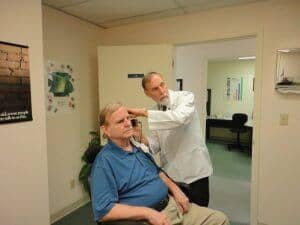 “I hear everything I want to hear, thank you very much” was my grandmother’s response whenever we asked why she refused to use a hearing aid. As far back as I can recall, my granny was deaf. Not completely deaf but hearing compromised to the point where we would have to repeat most things and speak loudly. Was her hearing loss something that comes with age?
“I hear everything I want to hear, thank you very much” was my grandmother’s response whenever we asked why she refused to use a hearing aid. As far back as I can recall, my granny was deaf. Not completely deaf but hearing compromised to the point where we would have to repeat most things and speak loudly. Was her hearing loss something that comes with age?
Hearing loss did not leave her feeling she was missing out – on anything. She was an avid reader and seemed to revel in not hearing what was happening in the world. She never seemed frustrated trying to decipher conversations, unlike those who were trying to engage with her.
Becoming deaf can be a gradual process, the result of cumulative assaults on our hearing. But once the damage is done, it cannot be undone. Does aging cause hearing loss? Yes, it is but one of the culprits.
What Causes Deafness?
Experts agree that one of the main contributors to becoming deaf is noise: workplace, loud tools, or other social gatherings. Stereos blaring at home or in your car and concerts are all a cumulative assault on our hearing. Ear infections, mumps, measles, meningitis, and whooping cough can also result in hearing loss.
Genetics plays a role.
Then there’s hearing loss, the result of aging called Presbycusis. This affects one person out of 3 by age 65 and 40% of the population over the age of 75. More than 80% of the population experiences hearing loss after the age of 85. Men usually experience the worst hearing loss with earlier onset.
Diabetes and high blood pressure, as well as any heart condition or stroke, can impact our ability to hear. A brain injury, tumor, or certain medications can also create hearing issues.
Other than the inevitability of aging, prevention seems to come down to lifestyle and healthy living. Avoiding anything that could damage our hearing has to be recommended.
Cognitive Decline 
Aside from the frustration of hearing loss, more troubling is an observed connection between hearing impairment and a 30-40% cognitive decline. There does appear to be an association: From Hearing Loss and Dementia — Who’s Listening , by Frank R. Lin MD PhD and Marilyn Albert PhD, HHS Public Assess comes this conclusion: “Neuroimaging studies have…demonstrated independent associations of hearing impairment with reduced cortical volumes in the auditory cortex and accelerated rates of lateral temporal lobe and whole brain atrophy.”
Whole brain atrophy is not something we aspire to. Neglecting our hearing loss may set us up for that very scenario. Given the number of people who will be diagnosed with Alzheimers or Dementia in our lifetime, scientists want to research this association. They hope to conclude that the use of assistive hearing devices will lower the incidence of cognitive decline. Seems such a simple solution, does it not?
First Signs of General Hearing Loss
Tinnitis is one of the first signs of hearing loss – that hissing, ringing nuisance that never seems to leave. Sometimes it is experienced in one ear, sometimes in both. One’s inability to follow a conversation in a group of people where there is background noise, also known as auditory processing disorder is another sign.
The impression that other people are mumbling indicates hearing impairment, as is straining to hear a conversation. Difficulty hearing on the telephone and asking people to repeat themselves is another red flag. Turning up the volume of the radio or television is a tell that hearing impairment is in play.
Someone who appears to be “out of it” may be someone who does not hear what is happening in their environment. Unable to hear, they are, therefore, unresponsive.
The Consequences
Our ability to hear is something we take for granted – until we lose it. Becoming progressively deaf has ramifications: social isolation with resulting loneliness, depression, and anxiety. Then there is this concern about cognitive decline, in part the result of hearing impairment.
Quality of life for the hearing impaired is impacted by three responses: emotional, behavioral (withdrawal and bluffing), and cognitive. Cognitive reactions present as confusion, lack of focus, distracted behavior, and frustration.
How do you Mitigate the Consequences of Hearing Loss?
The first step in assessing hearing loss is a visit to your doctor. A GP may then refer you to hearing specialists such as an otolaryngologist aka ENT (ear, nose and throat specialist) or an otologist. Depending on their diagnosis, and barring a recommendation for surgical intervention, you would be advised to schedule a hearing exam.
An audiogram is a test that will determine if hearing loss has occurred and if so, its severity. A hearing exam takes about an hour and is simple and non-invasive. A technician equips you with headphones and you respond appropriately to the signals sent through the headphones. An audiogram will indicate the softest sounds you can hear at different frequencies and pitches. This is like an eye exam whereby you read the line with the smallest letters.
If it is determined that you need a hearing aid, a specialist in audio assistive devices can advise on devices. They would help you determine which aid would be best suited to your requirements and budget.
Aids Are Available
Hearing aid technology continues to evolve and with it comes various options. Some devices are worn partially in the ear canal or completely in the canal or behind the ear. There are several other options. Which device you choose will depend on your preferences, lifestyle, and budget. There are several types of hearing aids available. Choosing one will be the first step, and the second will be an adjustment to the device. For starters, it may take some tinkering to find the optimal volume control.
Don’t order hearing devices over the internet or from some TV ad just because they offer cheaper pricing. You get what you pay for and you will need follow-up and expertise in the acquisition of hearing aids. Like all devices, at some point aids need servicing, adjustment or repair. You will need a business where you can go to get qualified, reliable support.
Buy From Reputable Professionals
Plus, hearing aids need to be properly fitted, seated, and adjusted (programmed) based on the results of your audiogram. Something ordered over the internet will not provide those necessary enhancements. An audiologist can show you how to use your hearing device. They will instruct on cleaning, how to tell when your battery is low and how to change a low battery. This necessary service all comes with the price of your device. Technicians will also be there for any tuning or fine-tuning of the device until it works to your satisfaction.
Will hearing aids restore your hearing to normal? Probably not. Technology is not there yet, but you can adjust with time. The benefit to cognitive health should override any frustration that sound is no longer as authentic as you remember. Researchers state that wearing a hearing aid gradually teaches the brain to hear again – so be patient in the adjustment period.

There Is No Benefit to Being Hearing Impaired
Unlike my grandmother, who was not a consumer of media, never turned on her radio, and never owned a television, most seniors today rely on media for their news and entertainment.
Keeping in the know is important. Hearing and discussing the news of the day with others is healthy and can be informative. Being able to carry on a normal conversation without having to ask others to repeat themselves several times makes for better dialog.
Hearing others and being heard can’t be underestimated. You may love someone with a hearing impairment, but after a while, the frustration of having to repeat yourself constantly grates. You then begin avoiding communicating all but the most important issues; sadly, conversation becomes a thing of the past.
There’s also the issue of safety. It’s dangerous if a senior cannot hear properly. Driving, cycling, or simply walking can be hazardous if they can’t hear another vehicle approaching or a cyclist calling out a warning.
And finally, there is that research linking deafness to cognitive decline. That should give anyone pause, because if hearing assistive devices can slow or even prevent the onset of Alzheimer’s or Dementia, that in itself should seal the deal. So please get tested and take the necessary remedial action. Does aging cause hearing loss? Apparently, it does. Does hearing loss contribute to Alzheimer’s and Dementia? Science is telling us to err on the side of caution. Rectify your hearing loss with the tools that are available and preserve your cognitive abilities.
Disclaimer: You must not rely on the information on our website as an alternative to medical advice from your doctor or other professional healthcare providers

Hi Judith,
Very interesting! I have had Tinnitus for years, but it hasn’t got worse over time, thankfully.
I live in Hong Kong, where the level of ambient noise is ridiculously high. About 6 years ago moved out of the city to one of the outlying islands because the constant noise was driving up my stress levels – and I feel a heck of a lot better now!
I loved your grandmother’s comment..!
Cheers,
Martin.
Hi is hearing loss due to aging called Presbycusis then? Tinnitus is annoying I get a ring that pops up in my ear every now and again. I just hope it doesn’t pop up and stay forever. If I go out to loud environments I bring earplugs with me now. But that was interesting linking deafness to the development of Alzheimers or Dementia as well and making sure that if you keep hearing well it will be able to slow the progress. That would make people want to keep hearing well.
Hi Jeremy: Hearing loss accompanies aging and by age 85 the majority of people have it in some form. The best thing you can do to avoid cumulative damage over the years is to avoid noise filled environments everywhere, whether it’s a concert or your workplace. All noise above 85dB does irreversible damage to our ability to hear. And yes, the research into the association between deafness and the onset of Alzheimers and Dementia is especially interesting given the tsunami of cases we are seeing today.
Wise move Martin moving to a less stressful, less noise filled environment. Life is short and quality of life matters. Thank you for your input.